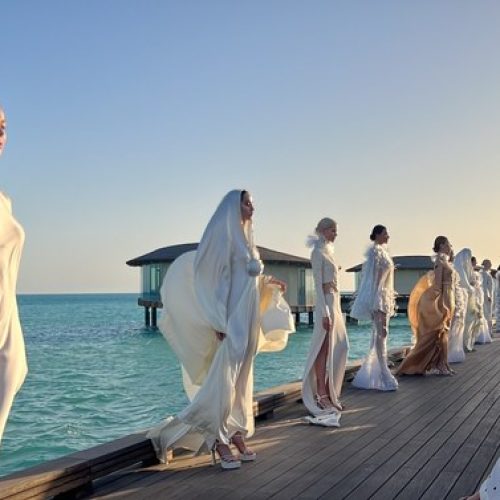As celebrities ascended the steps of the Metropolitan Museum of Art for the 2024 Met Gala on Monday, thousands of miles away, the border at Rafah was closed, trapping Palestinians within the confines of an escalating genocide in Gaza. The juxtaposition of these two events on the same night served as a troubling showcase of our skewed global priorities—where a night of fashion garners more attention than a humanitarian crisis.
The Rafah border’s closure is a disaster for countless families seeking refuge, effectively sealing off a critical escape route and aid path when it is most desperately needed. Meanwhile, the reported cost of attendance at the Met Gala, $75,000 per ticket, stands in stark contrast to the desperate need for medical supplies, food, and shelter in Gaza—a sum that could evacuate an entire Palestinian family.
Yet, the urgency of this crisis finds little resonance in the lavish red carpet of the annual event, where the spectacle of wealth and celebrity continues undisturbed by the realities of war.
This year’s Met Gala theme, “The Garden of Time,” inspired by J.G. Ballard’s 1962 dystopian short story, adds an unsettling layer of irony to the event.
Ballard was an English novelist, satirist, and essayist, celebrated for his provocative works that deeply explore the intricate relationships between human psychology and mass media. Known for his vividly dystopian novels, such as Crash and High-Rise, Ballard’s stories often delve into the unsettling territories of futuristic societies where technological and psychological environments intertwine to reveal both the frailties and manipulations of the human condition. His stories challenge readers to reflect on the ethical implications of modernity and consumer culture.
The Garden of Time is a lesser-known yet equally thought-provoking short story by Ballard. The plot revolves around a count and countess who live in a magnificent but isolated garden, shielded from the decaying world outside their estate. As a faceless mob approaches, threatening their existence, the couple uses a collection of rare flowers, which, when plucked, can halt time momentarily, delaying their inevitable confrontation with reality. Each flower represents a moment of reprieve, yet as their garden’s bloom dwindles, so too does their ability to stave off the advancing destruction. The story is a poignant metaphor for denial and the fleeting nature of time, encapsulating Ballard’s themes of social decay and the elite’s detachment from pressing global realities.
The selection of The Garden of Time as the theme for this year’s Met Gala, amidst the backdrop of the Gaza crisis, strikes a deeply ironic note. The narrative’s focus on affluent isolation and temporal distortion mirrors the stark divide between the Met Gala’s spectacle and the urgent humanitarian needs in Gaza.
This dystopian reality was perfectly encapsulated by South African pop star Tyla’s dramatic entrance at the Gala—being carried up the stairs by security guards— which captured more international headlines than the heart-wrenching scenes of Palestinian parents carrying the lifeless bodies of their children. This disturbing scene is emblematic of a broader societal issue where the extravagance of celebrity events overshadows grave injustices and human suffering.
While the attendees are adorned in designer creations within the Met’s metaphorical garden, outside, the world grapples with real crises—underscoring the dissonance between the gala’s theme and the role of its participants in addressing global suffering. This juxtaposition invites a critical reflection on the responsibilities of those shielded by wealth and influence, challenging them to engage meaningfully with the world beyond their cultivated, temporal havens.
The Met Gala, often seen as a pinnacle of fashion and culture, undeniably offers a moment of escapism and artistic celebration. However, it also reflects and amplifies the inequalities and attention disparities in our global society.
What’s more, the silence of many celebrities regarding the tragedy in Gaza is telling. These influential figures have the capacity to shift public discourse and mobilize action. Their voices could advocate for the reopening of borders, push for ceasefires, and call for humanitarian aid, yet the focus remains elsewhere. Why is a pop star’s theatrical entrance more newsworthy than the dire situation of an entire population under siege?
Ballard’s story highlights the folly of the elite, isolated in their luxurious but ultimately artificial environments, much like the attendees of the Met Gala, who remain seemingly detached from current global crises. The irony is profound and deeply unsettling, as the theme intended as a critique becomes a live enactment by those it aims to criticize. At least, everyone in attendance was on theme for once.




